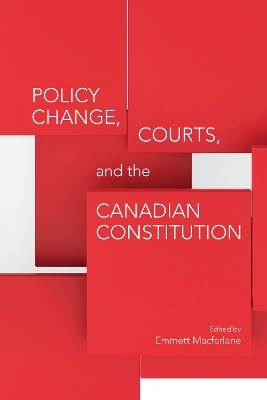
Policy Change, Courts, and the Canadian Constitution
University of Toronto Press (Verlag)
978-1-4875-2315-2 (ISBN)
Policy Change, Courts, and the Canadian Constitution aims to further our understanding of judicial policy impact and the role of the courts in shaping policy change. Bringing together a group of political scientists and legal scholars, this volume delves into a diverse set of policy areas, including health care issues, the regulation of elections, criminal justice policy, minority language education, citizenship, refugee policy, human rights legislation, and Indigenous policy.
While much of the public law and judicial politics literatures focus on the impact of the constitution and the judicial role, scholarship on courts that makes policy change its central lens of analysis is surprisingly rare. Multidisciplinary in its approach to examining policy issues, this book focuses on specific cases or policy issues through a wide-ranging set of approaches, including the use of interview data, policy analysis, historical and interpretive analysis, and jurisprudential analysis.
Emmett Macfarlane is an associate professor of political science at the University of Waterloo
Introduction: Judicial Policy Impact in Canada
Emmett Macfarlane (University of Waterloo)
PART I – Approaches and Theories of Policy Change
Chapter 1: Lessons from Public Policy Theories: Ask About Policy Change First, Courts Second
Minh Do (University of Toronto)
Chapter 2: Closing a Door but Opening a Policy Window: Legislating Assisted Dying in Canada
Dave Snow (University of Guelph) and Kate Puddister (University of Guelph)
Chapter 3: The Supreme Court of Canada, Judicial Remedies, and Punctuated Equilibrium
Marc Zanoni (University of Guelph)
PART II – Institutional Contexts
Chapter 4: The Charter, Policy, and Political Judgment
Janet Hiebert (Queen’s University)
Chapter 5: Collaborative Federalism and the Role of the Supreme Court of Canada
Robert Schertzer (University of Toronto)
Chapter 6: The Impact of Constitutional References on Institutional Reform
Kate Glover (Western University)
Chapter 7: The Desuetude of the Notwithstanding Clause – And How to Revive It
Richard Albert (University of Texas at Austin)
PART III – Policy Issues
Chapter 8: The Charter Beat: The Impact of Rights Decisions on Canadian Policing
Troy Riddell (University of Guelph) and Dennis Baker (University of Guelph)
Chapter 9: Protecting Against Cruel and Unusual Punishment: Section 12 of the Charter and Mandatory Minimum Sentences
Kate Puddister (University of Guelph)
Chapter 10: Third Party Policy and Electoral Participation after Harper v. Canada: A Triumph of Egalitarianism?
Erin Crandall (Acadia University) and Andrea Lawlor (Western University)
Chapter 11: Section 23 of the Charter and Official-Language Minority Instruction in Canada: The Judiciary’s Impact and Limits in Education Policymaking
Stéphanie Chouinard (Royal Military College of Canada)
Chapter 12: The Charter of the French Language and the Supreme Court of Canada: Assessing Whether Constitutional Design Can Influence Policy Outcomes
James B. Kelly (Concordia University)
Chapter 13: When is a Citizen No Longer a Citizen? Analyzing Constructions of Citizenship in Canada’s Judicial and Legislative Forums
Megan Gaucher (Carleton University)
Chapter 14: Taking the Harper Government’s Refugee Policy to Court
Chris Anderson (Wilfrid Laurier University) and Dagmar Soennecken (York University)
Chapter 15: Carter Conflicts: The Supreme Court of Canada’s Impact on Medical Assistance in Dying Policy
Eleni Nicolaides (University of Guelph) and Matthew Hennigar (Brock University)
Chapter 16: Canadian Abortion Policy and the Limitations of Litigation
Rachael Johnstone (Queen’s University)
Chapter 17: Contrasting Visions of Indigenous Rights, Recognition, and Territory: Assessing Crown Policy in the Context of Reconciliation and Historic Obligations
Michael McCrossan (University of New Brunswick)
Chapter 18: After Marriage Equality: Courting Queer and Trans Rights
Kyle Kirkup (University of Ottawa)
Conclusion: Policy Influence and Its Limits: Assessing the Power of Courts and the Constitution
Emmett Macfarlane (University of Waterloo)
| Erscheinungsdatum | 14.11.2018 |
|---|---|
| Verlagsort | Toronto |
| Sprache | englisch |
| Maße | 152 x 229 mm |
| Gewicht | 620 g |
| Themenwelt | Literatur ► Essays / Feuilleton |
| Recht / Steuern ► Allgemeines / Lexika | |
| Recht / Steuern ► EU / Internationales Recht | |
| Recht / Steuern ► Öffentliches Recht | |
| Sozialwissenschaften ► Politik / Verwaltung ► Politische Theorie | |
| Sozialwissenschaften ► Politik / Verwaltung ► Staat / Verwaltung | |
| Veterinärmedizin ► Allgemein ► Fleischhygiene / Lebensmittelkunde | |
| ISBN-10 | 1-4875-2315-7 / 1487523157 |
| ISBN-13 | 978-1-4875-2315-2 / 9781487523152 |
| Zustand | Neuware |
| Informationen gemäß Produktsicherheitsverordnung (GPSR) | |
| Haben Sie eine Frage zum Produkt? |
aus dem Bereich


